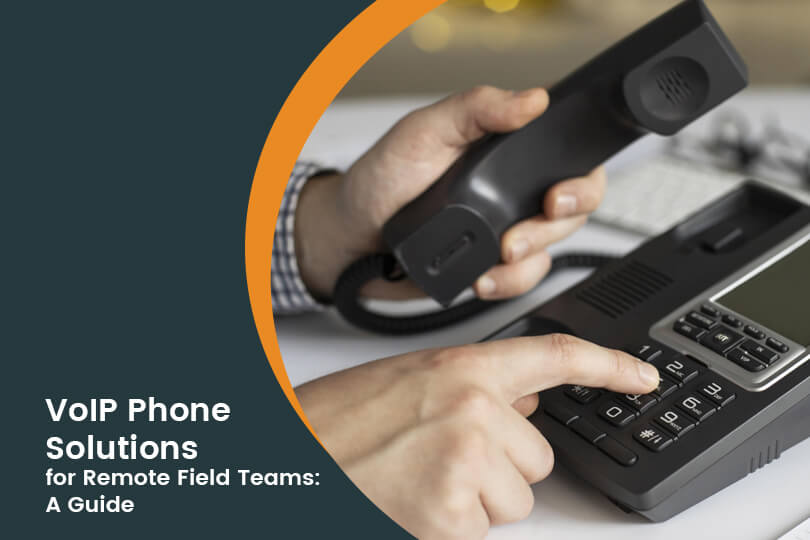VoIP Phone Solutions for Remote Field Teams: A Complete Guide for Service Businesses

What makes communication more challenging for field service businesses? You guessed it right—managing remote staff. Unlike most traditional workspaces, field service is primarily dependent on field technicians who visit customers in person and address their problems. While it is convenient for the customers to communicate with them, it makes the job harder for managers, dispatchers, or business owners to get hold of them or relay information. This is exactly what VoIP phone solutions can help you with.
Improve remote communication with field technicians with Field Promax.Sign Up now to learn more.
Remote communication plays a pivotal role in field service operations, enabling seamless coordination between on-site technicians, dispatchers, and customers. In field service, timely communication is essential for addressing customer inquiries, coordinating service appointments, and troubleshooting issues efficiently. VoIP phone solutions play a crucial role in facilitating remote communication by providing a reliable and flexible platform for voice communication over the Internet.
With VoIP, field service technicians can stay connected with dispatchers and team members regardless of their location, accessing critical information, receiving real-time updates, and collaborating effectively to resolve service requests. Using a VoIP solution consolidates communication channels into a single platform, simplifying management and reducing the costs associated with maintaining multiple phone numbers. Additionally, VoIP solutions offer advanced features like call forwarding, voicemail-to-email transcription, and unified messaging, providing greater flexibility and efficiency compared to managing disparate phone numbers.
Despite the multiple benefits of VoIP phone solutions, it is not yet a widely popular communication channel, especially among small businesses. This is primarily because most people are unaware of this cutting-edge technology and the competitive advantage it provides to field service providers.
This is why we put together this blog, where you will find everything you need to know about VoIP phone solutions, including how they work, their benefits, and how they can help you improve remote communication with your field service technicians.
VoIP Phone Solutions: An Overview
VoIP stands for Voice over Internet Protocol. Therefore, a VoIP phone solution essentially refers to a telecommunications technology that allows users to make and receive phone calls over the Internet rather than traditional telephone lines. In a VoIP system, analog voice signals are converted into digital data packets, which are transmitted over the internet to the recipient. These digital packets are then converted back into analog audio signals, allowing the recipient to hear the caller’s voice. VoIP phone solutions utilize the internet as the medium for communication, making them highly flexible and cost-effective compared to traditional phone systems.
VoIP phone solutions offer features such as call forwarding, voicemail, conferencing, and mobile integration with other business applications, enhancing productivity and collaboration for users, thus empowering field service professionals to deliver exceptional service while on the go. By leveraging VoIP phone solutions, field service organizations can enhance communication, streamline operations, and ultimately improve customer satisfaction.
In practice, a VoIP phone solution typically involves the use of VoIP-compatible devices such as IP phones, softphones (software-based phones), or adapters that connect traditional analog phones to the internet. Users can place calls using these devices by dialing a phone number or selecting a contact from their address book. The VoIP system then establishes a connection between the caller and the recipient by routing the call through the Internet. During the call, voice data is transmitted in real-time as digital packets, ensuring clear and reliable communication.
Overall, VoIP phone solutions provide businesses with a modern and efficient telecommunications solution that leverages the power of the Internet for cost-effective and feature-rich communication.
Key Features of a VoIP Phone System:
- Call forwarding: Redirect calls to another number or device.
- Voicemail-to-email: Receive voicemail messages as email attachments.
- Conference calling: Conduct virtual meetings with multiple participants.
- Caller ID: Display caller information before answering calls.
- Call waiting: Receive notifications of incoming calls while on another call.
- Unified messaging: Access voicemail, email, and fax messages in a single inbox.
- Auto-attendant: Automated voice menus for call routing and information.
- Mobile integration: Make and receive calls using mobile devices.
- Video calling: Conduct face-to-face conversations using video technology.
- Presence information: View the availability status of contacts in real time.
- Integration with business applications: Connect VoIP systems with CRM, ERP, or helpdesk software.
VoIP Phone Solutions vs. Traditional Phone Solutions
The fundamental difference between a VoIP phone solution and a traditional telephone system lies in the method of transmission. While traditional telephone systems rely on dedicated physical lines to transmit analog signals, VoIP phone solutions utilize the internet to transmit digital data packets. This distinction enables VoIP systems to offer greater flexibility, cost savings, and advanced features compared to traditional systems. VoIP phone solutions can leverage existing internet infrastructure, allowing for seamless communication from any internet-connected device, while traditional systems are limited by the availability and capacity of physical phone lines.
Here are some more differences to show you why VoIP is better than traditional phone services:
| Aspect | VoIP Phone | Traditional Phone |
|---|---|---|
| Communication Medium | Utilizes the internet for the transmission of voice data packets. | Relies on dedicated physical phone lines for analog signal transmission. |
| Flexibility | Offers mobility and accessibility from any internet-connected device, enabling field technicians to stay connected on the go. | Limited mobility, typically requiring technicians to be within the vicinity of a physical phone line. |
| Cost Efficiency | Often more cost-effective, especially for long-distance or international calls, as it leverages existing internet infrastructure. | May incur higher costs for long-distance or international calls due to reliance on traditional phone lines. |
| Features | Provides advanced features such as call forwarding, voicemail-to-email transcription, and integration with other business applications, enhancing productivity and collaboration. | Offers basic features such as call waiting, caller ID, and voicemail, with limited integration capabilities. |
| Scalability | Easily scalable, allowing for quick addition or removal of phone lines as needed without the need for additional physical infrastructure. | Limited scalability, typically requiring installation of new phone lines for expansion, which can be time-consuming and costly. |
| Reliability | Generally reliable with good call quality when implemented correctly, although quality may vary depending on internet connection stability. | Traditionally reliable with consistent call quality, but susceptible to disruptions due to issues with physical phone lines or network congestion. |
Benefits of VoIP Phone Solutions
Considering the fundamental differences between a VoIP phone system and its traditional counterpart, it is evident that there are a myriad of benefits of VoIP systems when it comes to field service management. In truth, it has become a significant competitive advantage for any business that requires managing a remote team. So, before we proceed to understand how this advanced technology may help you in your regular workflow, let’s try to understand a key concern in this regard—what are the benefits of VoIP?
Here are some of the most prominent ones:
- Cost Savings
VoIP phone solutions can significantly reduce communication costs for field service businesses. Instead of paying for traditional phone lines and long-distance charges, VoIP utilizes the internet for calls, often resulting in lower expenses. For example, a field service company with technicians spread across different locations can save money on long-distance calls by using VoIP to communicate internally and with customers without incurring extra charges.
- Mobility
VoIP enables field service technicians to stay connected while on the move. They can make and receive calls from any internet-connected device, such as smartphones or laptops, allowing them to respond to customer inquiries or update job statuses even when away from the office. For instance, a technician performing repairs at a client’s site can easily contact the main office or another technician for assistance using their mobile device and VoIP app.
- Flexibility
VoIP phone solutions offer flexibility in managing calls and communication preferences. Technicians can forward calls to their mobile phones or home offices, ensuring they never miss important calls while out in the field. Additionally, they can set up voicemail-to-email transcription, which converts voicemail messages into text and sends them to their email inbox for easy access and reference.
- Enhanced Collaboration
VoIP enables seamless collaboration among field service teams. With features like conference calling and video conferencing, technicians can hold virtual meetings to discuss projects, share updates, and troubleshoot issues in real time, regardless of their physical locations. This facilitates efficient problem-solving and decision-making processes, leading to improved service delivery.
VoIP phone solutions contribute to better customer service experiences. Field service technicians can quickly respond to customer inquiries, schedule appointments, and provide updates on service requests, leading to higher customer satisfaction. For example, a technician can use VoIP to promptly call a customer to confirm their appointment or inform them of any delays, ensuring a positive customer experience.
- Scalability
One of the most significant benefits of VoIP for business is its scalability. VoIP systems are highly scalable, making them suitable for growing field service businesses. As the company expands and hires more technicians, additional phone lines can be easily added to accommodate the increased communication needs. This scalability ensures that the VoIP system can grow with the business without requiring significant investments in infrastructure.
- Integration with Business Applications
Many VoIP phone solutions offer integration with other business applications, such as customer relationship management (CRM) software or field service management systems. This integration streamlines workflows by automatically logging call details, customer information, and service requests, providing technicians with valuable context before and during customer interactions.
- Remote Access to Voicemail
VoIP systems allow technicians to access their voicemail messages remotely, providing greater flexibility and convenience. Whether they are on-site with a customer or traveling between locations, technicians can listen to voicemail messages, prioritize callbacks, and take necessary action promptly using this remote phone service. This ensures that important messages are not missed and customer inquiries are addressed in a timely manner.
- Advanced Call Handling Features
VoIP offers a range of advanced call-handling features that improve efficiency and professionalism in field service operations. These features include call forwarding, call routing based on time or location, interactive voice response (IVR) menus, and automatic call distribution (ACD) for evenly distributing incoming calls among available technicians. By leveraging these features, field service businesses can optimize call management and deliver a seamless experience to customers.
- Reliability and Redundancy
Despite relying on internet connectivity, VoIP phone solutions are generally reliable when implemented correctly. Many VoIP providers offer redundancy and failover mechanisms to ensure uninterrupted service in case of internet outages or network disruptions. For instance, businesses can set up call forwarding to backup numbers or utilize mobile data networks as a fallback option during internet downtime, ensuring continuous communication for field service operations.

How VoIP Phone Systems Can Help Remote Technicians
Just as VoIP phone solutions benefit service businesses in general, they can be a great tool to empower field technicians who work at remote job sites. Here is how:
- Real-time Communication
VoIP phone systems enable remote field technicians to stay connected with their team members and supervisors in real time. Whether they need assistance with troubleshooting or clarification on job details, technicians can quickly communicate via voice calls, reducing downtime and improving efficiency.
- Access to Centralized Information
With VoIP, field technicians can access centralized databases and knowledge bases, enabling them to retrieve essential information on the go. Whether they need to refer to project specifications, safety guidelines, or client contact details, having access to this information via their VoIP system enhances productivity and accuracy in the field.
- Mobile App Functionality
Many VoIP phone systems offer mobile apps that allow field technicians to make and receive calls, access voicemail, and collaborate with team members from their smartphones or tablets. This mobile app functionality ensures that technicians can stay connected and productive even when they’re away from their desks or on-site with clients.
- Integration with Field Service Management Software
VoIP phone systems can integrate seamlessly with field service management software, providing technicians with access to job schedules, work orders, and customer information directly from their phone system. This integration streamlines workflows, reduces administrative overhead, and improves overall efficiency for remote field technicians.
- Enhanced Customer Communication
VoIP systems empower remote field technicians to maintain clear and effective communication with clients. Whether they need to provide updates on job progress, confirm appointments, or address customer inquiries, VoIP enables technicians to communicate professionally and promptly, enhancing customer satisfaction and trust.
- Improved Collaboration and Support
VoIP phone systems facilitate collaboration and support among remote field technicians and their colleagues. Whether they need to consult with subject matter experts, escalate issues to supervisors, or participate in virtual meetings, VoIP enables seamless communication and collaboration, fostering a supportive and cohesive team environment, even when team members are dispersed geographically.

How to Implement VoIP Phone Solutions in Field Service Management
Now that you know what a VoIP phone solution is and how it benefits both your technicians and your business, it is time to grapple with the most crucial aspect-learning how to integrate a VoIP system into your workflow. No matter how daunting the task looks, it is actually easier than you think. All you need to do is follow these simple steps.
- Choose the Right VoIP Provider
Start by selecting a reliable VoIP provider that offers features tailored to the needs of field service businesses. Look for providers that offer mobile apps, call forwarding, and voicemail-to-email transcription, which are essential for remote communication in the field.
- Install VoIP Apps on Mobile Devices
Equip your field service technicians with smartphones or tablets and install the VoIP app provided by your chosen VoIP provider. These apps allow technicians to make and receive calls using their mobile devices, ensuring they can stay connected while on the go.
- Forward Calls to Mobile Devices
Set up call forwarding to redirect calls from your office phone system to technicians’ mobile devices when they’re out in the field. This ensures that technicians never miss important calls from customers or dispatchers, even when they’re away from the office.
- Enable Voicemail-to-Email Transcription
Activate the voicemail-to-email transcription feature offered by your VoIP provider. This feature converts voicemail messages into text and sends them to technicians’ email inboxes, allowing them to quickly review and respond to messages without having to listen to voicemails.
- Hold Virtual Meetings with Video Conferencing
Use the video conferencing feature of your VoIP phone solution to hold virtual meetings with field service technicians, dispatchers, and other team members. Video conferencing allows for face-to-face communication and collaboration, even when team members are spread out across different locations.
- Utilize Call Recording for Training and Quality Assurance
Take advantage of the call recording feature offered by your VoIP system to record calls between technicians and customers. These recordings can be used for training purposes, quality assurance, and resolving disputes with customers.
- Integrate VoIP with Field Service Management Software
If your field service management software offers integration with VoIP systems, take advantage of this feature to streamline workflows and improve efficiency. Integration allows for automatic logging of call details, customer information, and service requests, providing technicians with valuable context before and during customer interactions.
- Provide Training and Support
Ensure that your field service technicians are properly trained on how to use the VoIP phone system and its features. Offer ongoing support and troubleshooting assistance to help technicians overcome any challenges they may encounter while using the system in the field.
In conclusion
VoIP phone solutions have emerged as a crucial competitive advantage for field service businesses in today’s dynamic market landscape. By harnessing the power of internet-based communication, VoIP systems offer unparalleled flexibility, mobility, and efficiency, enabling field service technicians to stay connected and productive regardless of their location. With features such as call forwarding, voicemail-to-email transcription, and video conferencing, VoIP empowers field service businesses to deliver exceptional customer service, streamline operations, and stay ahead of the competition. In an era where remote communication is more important than ever, embracing VoIP technology is not just a choice but a strategic imperative for field service businesses looking to thrive in the digital age.
To optimize the benefits of a VoIP system, however, it is best to combine it with a field service software system. Integrating a VoIP system with field service management software offers numerous benefits for businesses operating in the field service industry. By combining these two technologies, businesses can streamline their operations and enhance efficiency in several ways. Firstly, integration allows for seamless communication between field service technicians, dispatchers, and customers, as all relevant information from calls can be automatically logged and stored within the field service management software. This facilitates better coordination, faster response times, and improved customer service experiences.
With FSM software solutions like Field Promax, this integration enables technicians to access important customer data and service history during calls, empowering them to provide personalized and informed assistance. Overall, leveraging a VoIP system integrated with field service management software optimizes workflows, enhances communication, and ultimately boosts productivity and customer satisfaction, all contributing to increased profitability and business sustainability.
So, what are you waiting for? Embrace advanced technology to make the most of your business.
For more resources anf information, Contact FIED PROMAX.
Originally Published at – Field Promax (VoIP Phone Solutions for Remote Field Teams)

